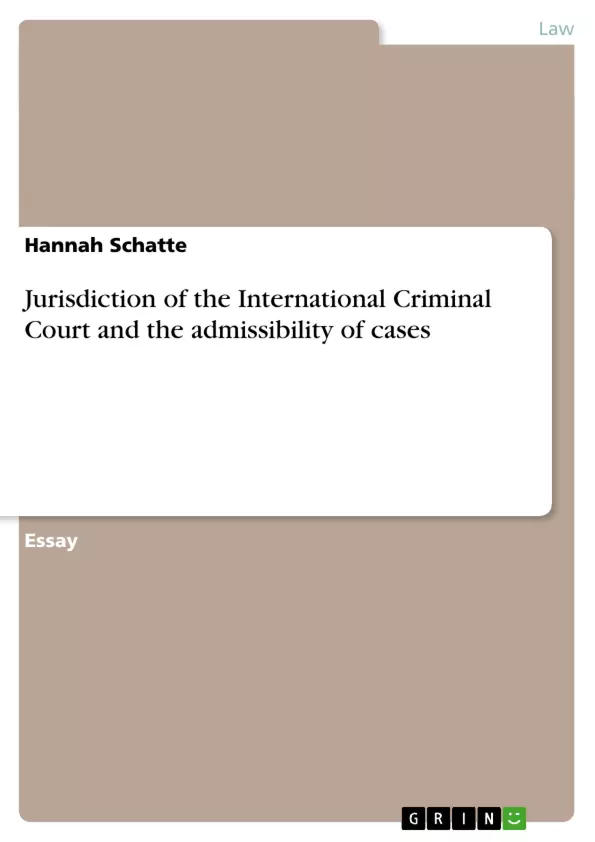Fifty years after the Nuremberg-Tribunal, the U.N. Commission of Experts on the Former Yugoslavia stated, that “states may choose to combine their jurisdictions under the universality principle and vest this combined jurisdiction in an international tribunal.”
This tribunal, the International Criminal Court (ICC), finally was created by a diplomatic conference held in Rome in 1998, where 120 States voted to adopt the Rome Statute of the International Criminal Court , rendering into force in 2002.
This detailed international treaty provides for the creation of an international criminal court with power to try and punish for the most serious violations of human rights in cases where national justice systems fail at the task.
The ICC therefore ushers in a new era in the protection of human rights. Some authors even say that to a great extent, the success of the Court parallels the growth of the international human rights movement, much of whose fundamental philosophy and outlook it shares.
Lately mainly questions concerning the Iraq-conflict were raised, concerning the problem, whether criminal proceedings against the main actors before the ICC would be “successful”.
Inhaltsverzeichnis (Table of Contents)
- Introduction
- Jurisdiction of the International Criminal Court
- Types of crimes
- The preconditions to exercise jurisdiction
- Extraterritorial jurisdiction
- The relationship between the ICC and the Security Council
- Admissibility of cases
- Example: the Lubanga-case
- Complementarity
- Gravity
- Limitations
- Example: the Lubanga-case
- Possibilities of prosecution of violations of international humanitarian law in Iraq
Zielsetzung und Themenschwerpunkte (Objectives and Key Themes)
This work aims to explore the jurisdiction and admissibility of cases before the International Criminal Court (ICC). It focuses on the ICC's role in prosecuting the most serious crimes of concern to the international community, including genocide, crimes against humanity, and war crimes. Key themes explored in the text include:- The scope of the ICC's jurisdiction and the types of crimes it can prosecute.
- The conditions under which the ICC can exercise jurisdiction, particularly in relation to the principle of complementarity.
- The importance of international cooperation in ensuring the effectiveness of the ICC.
- The challenges faced by the ICC in prosecuting crimes committed in the context of armed conflict.
Zusammenfassung der Kapitel (Chapter Summaries)
Introduction
This chapter introduces the International Criminal Court (ICC) and its origins, highlighting its significance in the protection of human rights. It discusses the establishment of the ICC through the Rome Statute, which defines its mandate and powers.Jurisdiction of the International Criminal Court
This chapter delves into the types of crimes over which the ICC has jurisdiction, specifically focusing on genocide, crimes against humanity, war crimes, and the crime of aggression. It examines the definitions of these crimes as outlined in the Rome Statute and relevant international conventions.The preconditions to exercise jurisdiction
This chapter explores the conditions that must be met for the ICC to exercise jurisdiction. It highlights the principle of complementarity, emphasizing that the ICC only intervenes when national courts are unwilling or unable to prosecute. The chapter also discusses the limitations of the ICC's jurisdiction, such as the requirement for a State Party to be involved or the Security Council's referral of a situation.Extraterritorial jurisdiction
This section examines the extraterritorial aspect of the ICC's jurisdiction, particularly in relation to war crimes and genocide. It discusses the universality principle and the application of customary law to these crimes.Admissibility of cases
This chapter delves into the criteria for admissibility of cases before the ICC. It examines the principle of complementarity and the gravity of the alleged crimes. It also highlights the limitations on the ICC's jurisdiction, such as the requirement for a State Party to be involved or the Security Council's referral of a situation.Possibilities of prosecution of violations of international humanitarian law in Iraq
This chapter explores the potential for prosecution of violations of international humanitarian law in Iraq before the ICC. It examines the challenges and considerations involved in such prosecutions, taking into account the complex political and legal landscape.Schlüsselwörter (Keywords)
The key terms and concepts central to this work include international criminal law, the International Criminal Court (ICC), jurisdiction, admissibility, complementarity, genocide, crimes against humanity, war crimes, crime of aggression, international human rights, and the Rome Statute.Frequently Asked Questions
What is the International Criminal Court (ICC)?
The ICC is an international tribunal created by the Rome Statute in 1998 with the power to prosecute individuals for the most serious violations of human rights, such as genocide and war crimes.
Which types of crimes fall under the ICC's jurisdiction?
The ICC has jurisdiction over genocide, crimes against humanity, war crimes, and the crime of aggression as defined in the Rome Statute.
What is the principle of complementarity?
Complementarity means that the ICC only intervenes when national justice systems are unwilling or unable to prosecute the crimes themselves.
Can the ICC exercise extraterritorial jurisdiction?
Yes, the ICC's jurisdiction includes extraterritorial aspects based on the universality principle and customary law, particularly concerning war crimes and genocide.
What are the criteria for a case to be admissible?
Admissibility is determined by the principle of complementarity and the gravity of the alleged crimes, as shown in examples like the Lubanga case.
Does the text discuss the conflict in Iraq?
Yes, the work explores the possibilities and challenges of prosecuting violations of international humanitarian law committed during the Iraq conflict before the ICC.
- Citation du texte
- Hannah Schatte (Auteur), 2008, Jurisdiction of the International Criminal Court and the admissibility of cases, Munich, GRIN Verlag, https://www.grin.com/document/139622



